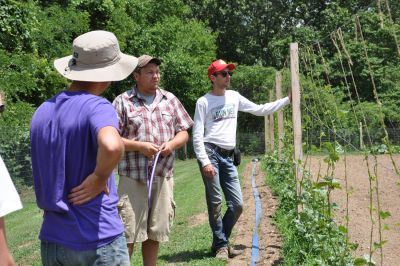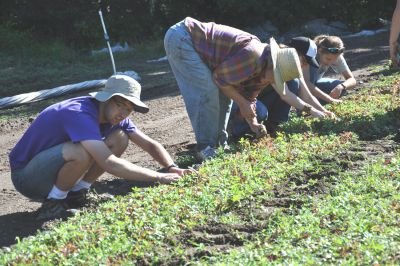Bugs, Butternut Sustainable Farm, and Beans

Every day at Rieth Village is filled with a diverse mixture of fieldwork and coursework. This week we spent our time transplanting varieties of heirloom tomatoes, ground cherries, eggplants, cucumbers and sweet potatoes, just to name a few. We also direct-seeded some bean varieties that I had never before encountered. I was most fascinated by the seeds of Phaseolus coccineus, the Scarlet Runner Bean. Its seeds are a beautiful mix of black and lavender and the size of quarters. The young green pods are edible and the seeds can be used fresh or as dried beans. Interestingly, some gardeners only grow it for the beauty of its scarlet flowers.
In the classroom, Professor Dave Miller introduced us to the wonderful world of insects. Although insects tend to be… well, pests, especially if they are chomping away on our Brassicas, we found that they are fascinating to study. We also learned many practical, yet essential, uses for a soil survey from Professor Bill Minter.

Our week ended with a trip to Three Rivers, Michigan. Our first stop was at the farm of James and Kate Lind: Sustainable Greens. Kate gave us a tour of the farm while pointing out the many different types of weeds that had sprouted along the path that can be used for nutritional or medicinal purposes. Sustainable Greens specializes in many different salad greens. Their produce is beyond ordinary, the mustard greens in particular packing a lot of flavor. As a reward for our weeding, we were given a generous supply of delicious salad. The spicy salad mix was by far my favorite!
For lunch we were invited to the house of Jon Templin, a 2012 ASI student and a true gentleman. He first served us a wonderful lunch of delicious grilled brats, potato salad and salad greens. The salad greens had grown at his brand-new farm, Butternut Sustainable Farm. Fresh out of finals this past semester he started converting a 5-acre plot from a hay field into a diversified vegetable farm. A tour showed us some of the difficulties encountered in the first year of a brand-new farm. Grass weeds and pests (primarily Maladera castanea, the Asiatic Garden Beetle) were abundant with substantial negative impacts. But Jon’s determination has not faltered leaving us with no doubts as to the future success of Butternut Sustainable Farm.
– Posted by Carina Zehr, 2012 agroecology student




